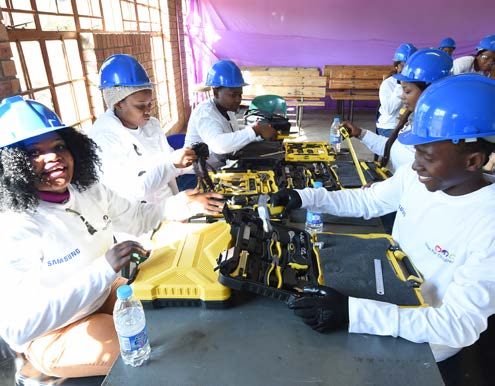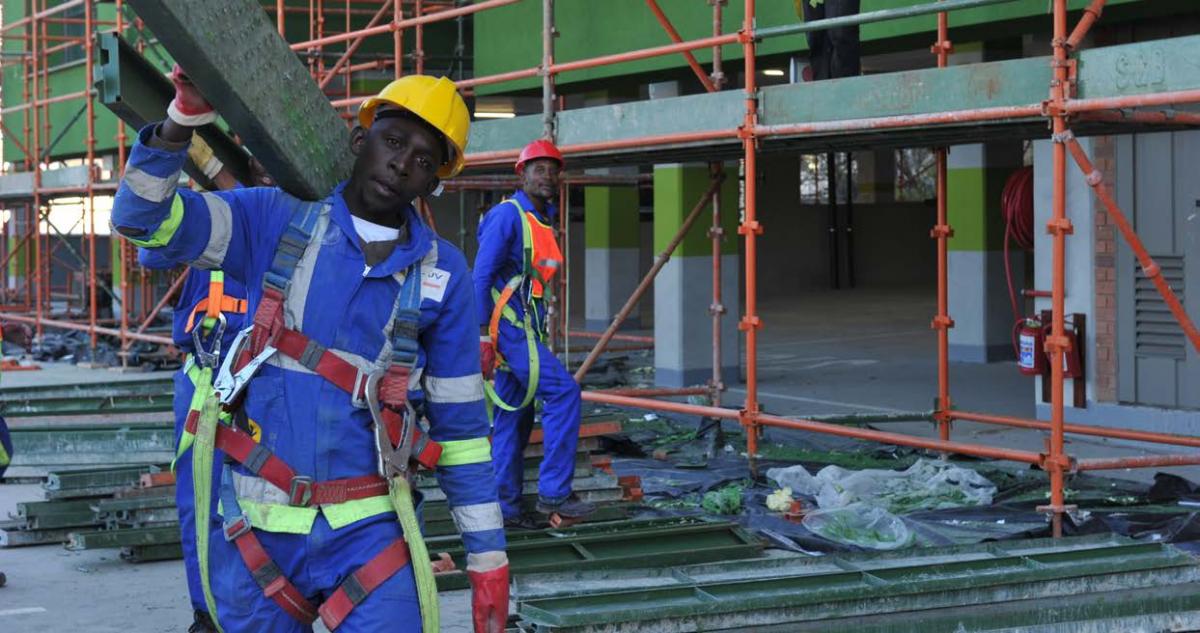Job creation
 Last year, the unemployment rate reached its highest recorded level. Unemployment had been caused by low growth, which in turn resulted from a long-term decline in investment. In the last year, government benefited from a clear and stable macroeconomic framework, strong commodity prices and a better-than-expected recovery.
Last year, the unemployment rate reached its highest recorded level. Unemployment had been caused by low growth, which in turn resulted from a long-term decline in investment. In the last year, government benefited from a clear and stable macroeconomic framework, strong commodity prices and a better-than-expected recovery.
However, government has been held back by an unreliable electricity supply, inefficient network industries and the high cost of doing business. Government has been taking extraordinary measures to enable businesses to grow and create jobs alongside expanded public employment and social protection.
“We all know that government does not create jobs. Business creates jobs. Around 80% of all the people employed in South Africa are employed in the private sector.” – President Cyril Ramaphosa, SoNA, 10 February 2022, Cape Town City Hall.
The key task of government is to create the conditions that will enable the private sector – both big and small – to emerge, to grow, to access new markets, to create new products, and to hire more employees. The problems in the South African economy are deep and they are structural.
Economic growth and jobs
While government helps existing industries to grow, it is also nurturing new opportunities for growth and jobs. Government and the private sector have worked closely together to grow the global business services sector from a small group of companies to one of the world’s leading players.
The global business services sector is on track to create 500 000 new jobs over the next few years. The hemp and cannabis sector has the potential to create more than 130 000 new jobs. Government is therefore streamlining the regulatory processes so that the hemp and cannabis sector can thrive like it is in other countries such as Lesotho.
People in the Eastern Cape, KwaZulu-Natal and elsewhere are ready to farm with this age-old commodity and bring it to market in new and innovative forms.
The social economy, including early childhood development, nursing, social work and community services, has significant potential not only to create jobs, but to provide vital services that communities need.
Some of the country’s mature industries also have a lot to offer in revamping the industrial and manufacturing potential of the country.
Presidential Employment Stimulus
The first two phases of the Presidential Employment Stimulus programmes, which government launched in October 2020, have supported over 850 000 opportunities. More than 80% of participants were young people and over 60% were women.
It has supported young women like Tracy Nkosi from Springs, who was employed as an education assistant at Welgedag Primary School, and who says this opportunity has motivated her to further her studies in the educational sphere.
It has also supported Mama Nosipho Cekwana from Impendle in KwaZulu-Natal who used her farming input voucher to buy maize, manure and supplements for her livestock.
The total number of direct beneficiaries will soon rise to over one million South Africans. This includes over half a million young people appointed as education assistants, making it the largest youth employment programme ever undertaken in the country’s history.
The employment stimulus will also enable the Department of Home Affairs to recruit 10 000 unemployed young people for the digitisation of paper records, enhancing their skills and contributing to the modernisation of citizen services.
Employment
 The Social Employment Fund will create a further 50 000 work opportunities using the capability of organisations beyond government, in areas such as urban agriculture, early childhood development, public art and tackling gender-based violence (GBV).
The Social Employment Fund will create a further 50 000 work opportunities using the capability of organisations beyond government, in areas such as urban agriculture, early childhood development, public art and tackling gender-based violence (GBV).
In addition to expanding public employment, government is providing support to young people to prepare them for work and link them to opportunities.
To encourage hiring by smaller businesses, it will be increasing the value and expanding the criteria for participation in the Employment Tax Incentive.
For several years, this has been an effective way to encourage companies to hire new work seekers. The changes to the incentive will make it easier for small businesses in particular to hire young people. The Minister of Finance will announce the details of these changes in the budget. Government calls on companies to support this effort, take up the incentive and give young people a place in the world of work.
Youth employment
The SAYouth.mobi platform for young work seekers to access opportunities and support now has more than 2.3 million young South Africans registered. Of these over 600 000 have been placed into employment opportunities.
A revitalised National Youth Service will recruit its first cohort of 50 000 young people during the next year, creating opportunities for young people to contribute to their communities, develop their skills and grow their employability.
The Department of Higher Education and Training will place 10 000 unemployed Technical and Vocational Education and Training graduates in workplaces from April 2022.
“In preparing this SoNA, I was assisted by two young South Africans who are working as interns in The Presidency, Ms Naledi Malatji and Ms Kearabetswe Mabatle. They told me about the pain felt by young people who find themselves with a qualification, but are unemployed because of lack of experience. This forces many into jobs that have little or nothing to do with what they studied. All of the measures I have outlined are essential to provide young people with the work experience that they need to take their first step into the labour market.” – President Cyril Ramaphosa, SoNA, 10 February 2022, Cape Town City Hall.
Government calls on the private sector to support these measures
- and wherever possible, to drop experience as a hiring requirement
- to give as many young people as possible their first job.
As government works to grow the economy and create jobs, it will expand support to poor families to ensure that no person in this country has to endure the pain and indignity of hunger.
Skilled immigrants
The world over, the ability to attract skilled immigrants is the hallmark of a modern, thriving economy. Government is therefore streamlining and modernising the visa application process to make it easier to travel to South Africa for tourism, business and work. As committed last year, the eVisa system has now been launched in 14 countries, including China, India, Kenya and Nigeria.
The revised Critical Skills List has been published for the first time since 2014, following detailed technical work and extensive consultations with business and labour. The updated list reflects the skills that are in shortage today, to ensure that the immigration policy matches the demands of the economy.
A comprehensive review of the work visa system is currently underway, led by a former Director-General of Home Affairs, Mr Mavuso Msimang. This review is exploring the possibility of new visa categories that could enable economic growth, such as a start-up visa and a remote working visa.
Related links
Source: State of the Nation Address Highlights [PDF]




